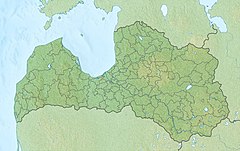Istra rolling hills
| Istra Hillock Nature Park | |
|---|---|
| Istras pauguraine | |
 | |
| Location | Latvia, Latgale, Ludza Municipality |
| Nearest city | Ludza |
| Coordinates | 56°16′12″N 28°02′35″E / 56.27000°N 28.04306°E |
| Area | 8.67 km2 (3.35 sq mi) [1] [2] |
| Established | 1977 |
Istra rolling hills (Template:Lang-lv) is nature park in Istra Parish, Ludza Municipality, Latgale, Latvia. The landscape protection area Istra rolling hills is located between Lake Šķaune and Lake Maroksna in Latgale upland and Rāznava hills.
This conservation area was first established in 1977 and measured only 340 ha at that time. It was created to protect the more forested part of the landscape with articulated terrain, pines, spruces and broad-leaved forests, a significant part of which are excessively moist European alder forests. Now the protected area extends to the eastern shores of Lake Škaune.
Located in the landscape protection area near former village Pavlova an ancient burial ground Pavlovas ( 56°16′54″N 28°05′19″E / 56.281720067971°N 28.088526589616°E )[3] is also under protection.[4]
Today, protected area is 866 ha. This is also the Natura 2000 area.[5]
Flora
There are two protected plant species — hairy agrimony (Agrimonia pilosa) and cutleaf anemone (Pulsatilla patens).[2]
Fauna
There are 16 protected species of birds — lesser spotted eagle (Aquila pomarina), hazel grouse (Bonasa bonasia), black tern (Chlidonias niger), white stork (Ciconia ciconia), black stork (Ciconia nigra), marsh harrier (Circus aeruginosus), corncrake (Crex crex), white-backed woodpecker (Dendrocopos leucotos), black woodpecker (Dryocopus martius), white-tailed eagle (Haliaeetus albicilla), red-backed shrike (Lanius collurio), black kite (Milvus migrans), osprey (Pandion haliaetus), honey buzzard (Pernis apivorus), common tern (Sterna hirundo), black grouse (continental subspecies) (Tetrao tetrix tetrix). [2]
References
- ^ Istras Pauguraine Protected Planet
- ^ a b c Istras pauguraine European Environment Agency
- ^ Pavlova ancient burial ground Vietas guide of Latvia.
- ^ Pavlovas ancient burial place. Ludzas pilsētas galvenā bibliotēka.
- ^ (in Latvian) Information about the landscape protection area

